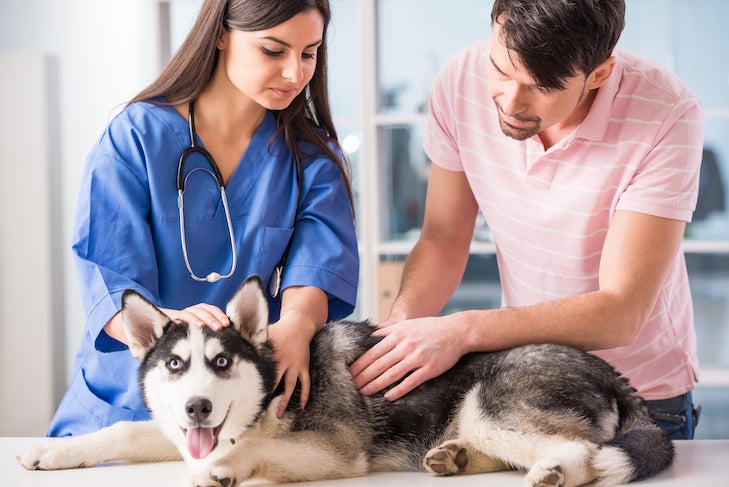
As a breeder, you know that a puppy can go from happily playing to feeling under the weather within a matter of hours. After several litters, you may know the symptoms that indicate a minor illness versus symptoms that could become an expensive medical emergency. Passing this knowledge on to your puppy owners can go a long way in helping your puppies live healthy lives.
AKC Pet Insurance looked at the illness claims for puppies under the age of one year to see which were most common in the last few years. In 2017, we saw more than a thousand incidents of gastroenteritis, close to 700 cases of urinary tract infections, about 450 incidents of allergies, and almost 400 claims for both dermatitis and colitis. You can read more about each of these conditions to enable you to educate your new puppy buyers.
Gastroenteritis
Gastroenteritis is an inflammation of the gastrointestinal tract – including the stomach and intestines. It is caused by infection with bacteria, virus, parasites or a reaction to medications or new food. Vomiting, diarrhea, lethargy, decreased appetite, dehydration, and abdominal pain are the major symptoms of gastroenteritis. Gastroenteritis can also be indicative of a more serious condition, so it’s important to visit a veterinarian right away if a puppy is showing symptoms.
The puppy’s veterinarian will eliminate more serious causes of the symptoms through diagnostic testing, performing a physical exam, and reviewing the puppy’s medical history, before diagnosing gastroenteritis. The vet will then treat the puppy by re-hydration, restoring the blood-electrolyte balance, and prescribing antibiotics if tests suggest a bacterial infection.
Urinary Tract Infections (UTI)
As its name implies, UTIs are an infection in the urinary tract that are commonly caused by bacteria. Urinary Tract Infections affect approximately 14 percent of dogs over the course of their lifetime. While it may be harder to detect in puppies who are still being housetrained, a previously housetrained puppy with a UTI may begin to have accidents in the house or request to go outside more frequently for bathroom breaks. Bloody or cloudy urine, licking around the genitals, and a fever are symptoms of a UTI. Ensuring your dog drinks plenty of fresh water, stays well-groomed around his genital area, and is encouraged to take frequent potty breaks will help reduce the chance of a urinary tract infection.

Allergies
According to the 2018 State of Pet Health Report from Banfield Pet Hospital, there has been a 30.7% increase in environmental allergy cases and a 12.5% increase in flea allergy cases in dogs over the last 10 years. Allergies are a reaction to foreign substances (allergens) by the body’s immune system that often result in itchy skin and a runny nose for your dog. A veterinarian can conduct a physical exam and allergy testing to help determine what is causing the allergy. Pet owners can provide relief to their itchy puppy with a few natural remedies. The top causes of allergies in dogs are fleas, food, and environmental allergens.
Flea Allergies
When a dog with flea allergies is bitten by a flea, the saliva in the bite causes a reaction that may leave the dog itchy with red, inflamed skin. As of 2017, flea allergies were determined to be prevalent in about 1.8 percent of dogs.
Environmental Allergies
Environmental allergens – such as dust, mold spores, and grass – can cause recurrent hot spots, runny eyes and itchy skin. While these allergies are often seasonal, if they are too severe, a puppy’s vet may provide medications as a relief to symptoms.
Food Allergies
Food allergies occur when a puppy’s body reacts to an ingredient in his diet. The puppy may suffer from full-body itchiness, face swelling, chronic ear infections, vomiting, or diarrhea. Once the puppy has been treated by a veterinarian, allergy testing and feeding an elimination diet can help to determine which ingredient is causing problems.
Dermatitis
Dermatitis is an inflammatory, chronic skin disease that is often associated with allergies. An allergic reaction brought on by an allergen in the environment, such as grass or house dust, may cause a puppy to begin excessively scratching, rubbing or licking his skin. The most common areas that are affected are the puppy’s ears, ankles, muzzle, groin, between the eyes and between the toes. Dermatitis symptoms normally appear when the dog is between three months to six years old.
The veterinarian will do a physical exam and possibly allergy test the dog before diagnosing him with dermatitis. In severe cases, the vet may prescribe medication to control the itching and keep the pup more comfortable. Pet owners can use anti-itch shampoo to help alleviate itching as well. Ask your veterinarian for advice when purchasing over-the-counter products
Colitis
Colitis is an inflammation of the large intestine or colon that most often is caused by stress, infection, ingestion of contaminated food, chronic exposure to a wet environment, or inflammatory bowel disease. The inflammation results in reduced water absorption and a decrease in the ability of the body to store feces in the colon. Puppies suffering from colitis may experience diarrhea, straining during defecation, or bright red blood in the stool. The puppy’s veterinarian will conduct fecal testing along with blood tests to determine if colitis is the cause of the symptoms. Colitis is treated through a restricted diet before starting a puppy on a low-fiber diet. Depending on the severity of the case, the puppy’s vet may prescribe antimicrobial drugs as well.
Benefits for Your Puppies
On the day that a puppy buyer comes to take their new family member home, there may be too much excitement to keep the new owner focused while you explain basics of puppy healthcare. By including our complimentary Pet Safety Handbook in your puppy packs, you’ll know that puppy owners will have up-to-date tips on everything from top infectious diseases to grooming tricks. By sending home the AKC Pet Insurance 30-Day Certificate, puppy buyers can choose to activate the certificate to receive 30 days of accident and illness coverage to protect their new pup against these and other unexpected illnesses.
This article is intended solely as general guidance, and does not constitute health or other professional advice. Individual situations and applicable laws vary by jurisdiction, and you are encouraged to obtain appropriate advice from qualified professionals in the applicable jurisdictions. We make no representations or warranties concerning any course of action taken by any person following or otherwise using the information offered or provided in this article, including any such information associated with and provided in connection with third-party products, and we will not be liable for any direct, indirect, consequential, special, exemplary or other damages that may result, including but not limited to economic loss, injury, illness or death.

